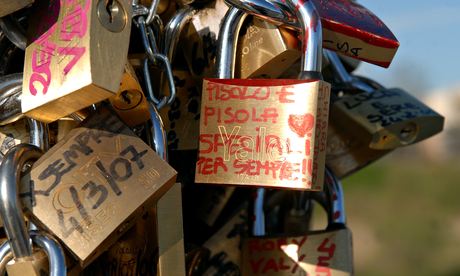
Thousands of times he turned, and then entered. He was a conduit to dreams, a gatekeeper to optimism, this mild-mannered man, this estate agent. He showed thousands of nervous singles, tense couples and excited families into their new homes, into their new lives. And then, when all was arranged, he gave them the keys and left. But he didn't entirely. He kept copies. He kept copies of all the keys, of all the properties he had handled in his career, over decades. Why? Perhaps to gain entry himself, at any time in the future …
This is more or less how I'd describe the setting of a brilliantly creepy and supremely paced novel I'm currently reading – A Pleasure and a Calling by Phil Hogan. Keys are banal objects we all carry with us – and though among our most trusted possessions, are barely ever thought about except during the few seconds they are used. They are symbols of safety and security. But behind every key, and lock, there's a room or a secret place full of objects, thoughts and feelings. And often with these, the theme of keys or locks can shape or feature in songs.
"With this key Shakespeare unlocked his heart," said William Wordsworth, in reference to the sonnet form, and in the same way the form and structure of song is a discipline that turns desires into music and words. Keys and locks are symbolic of many things, often power or sexual desire. Emily Brontë's Wuthering Heights jangles with such references. Hindley taunts his adopted brother Heathcliff and locks him out of the house. Later Heathcliff the toys with the overpowered Cathy with a bunch of keys. In Dickens' Great Expectations, a young Pip, upon visiting Mrs Haversham, is met at the gates by the cruel young Estella, keeper of keys to his desires, while, with her own strange upbringing, she herself remains emotionally locked out the ability to love.
But perhaps the most outrageous key and lock symbolism goes right back to Geoffrey Chaucer, who turned out many a mischievous phrase and lyric. In the Merchant's Tale, the old, blind knight Januarie, who marries young "fresshe' bride May, keeps a key to his own secret garden where he likes to take her and expose, among other things, his "slakke skinne". His servant, the lovestruck Damyan, then falls for May and makes a copy of the key by pressing it into wax. Damyan then manages to steal into the garden and entices the lusty and all too willing May into a tree with him, away from the confused Januarie, whereupon comes that notorious line of description: "Damyan gan pullen up the smok and in he throng". It's an unashamedly humorous and explicit line of reverse innuendo – of metaphorical key entering metaphorical lock, rather than vice versa.
Losing a set of keys can be a traumatic inconvenience. I once lost mine and had to spend a night trying to sleep in a phone box. You haven't lived until you've spent the night in a phone box. In many ways these small metal items can unlock a chain of surprising events as well as memories, and I've just unlocked some of mine there. Meanwhile there are also other kinds of locks and key phrases in song, literal and metaphorical – skeleton keys, lockers, padlocks, lockets, handcuffs, safes, deadlock, lockdown, being locked in or out of love, unlocking someone's heart, and the keys to success or failure. But the one kind of key we'll leave out this week are the role of musical keys - we'll put those aside for a more technical topic.
Key and lock technology has developed over the centuries, from combinations to hotel smartcards, pin numbers to fingerprint and iris recognition software, but it's interesting that most of us still us the same kinds of keys as those carried centuries ago. In the same way the feelings and memories locked inside us also never change, and also just like the human heart, still open up surprises.
Bearing in mind we've previously had topics of doors and prisons, there are still plenty of combinations for you to try. So jangle you song suggestions, unlock your own musical vaults and see what treasures you can find. Stepping in as this week's responsible keeper of the keys will be Mnemonic, who will unlock the secrets of these song selections next Thursday 8 May, so please turn in your ideas by last orders (11pm BST) on Monday 5 May.
To increase the likelihood of your nomination being considered, please:
• Tell us why it's a worthy contender.
• Quote lyrics if helpful, but for copyright reasons no more than a third of a song's words.
• Provide a link to the song. We prefer Muzu or YouTube, but Spotify, SoundCloud or Grooveshark are fine.
• Listen to others people's suggestions and add yours to a collaborative Spotify playlist.
• If you have a good theme for Readers recommend, or if you'd like to volunteer to compile a playlist, please email peter.kimpton@theguardian.com or adam.boult@theguardian.com
• There's a wealth of data on RR, including the songs that are "zedded", at the Marconium. It also tells you the meaning of "zedded", "donds" and other strange words used by RR regulars.
• Many RR regulars also congregate at the 'Spill blog.

